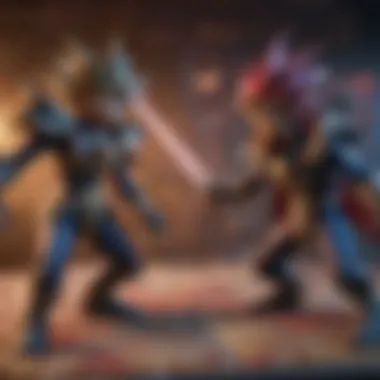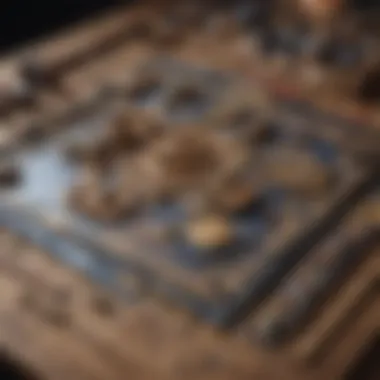Exploring the Yu-Gi-Oh! PC Game Landscape: Mechanics & Community


Intro
The Yu-Gi-Oh! series stands as a significant entry in the landscape of card games. Transitioning into the digital realm, especially on PC, has allowed this classic to evolve and reach new audiences. This exploration delves into the various facets of Yu-Gi-Oh! on PC, aiming to shed light on its gameplay mechanics and community dynamics.
The multifaceted experience encompasses distinct elements, affecting both casual players and competitive enthusiasts. Understanding this landscape requires examination of essential components, including gameplay review, storyline elements, and community impacts that resonate with gamers everywhere.
Overview of the Game
Game Title
Yu-Gi-Oh! Duel Links
Release Date
Originally released in January 2017, Yu-Gi-Oh! Duel Links made its PC debut later, contributing greatly to the franchise's expansion.
Developer
Konami designed and developed the game. Its expertise in crafting unique gaming experiences is reflected in this adaptation of the card game.
Genre
Acting primarily as a digital card game, Yu-Gi-Oh! integrates tactical strategy with elements of single-player and competitive multiplayer experiences. The layered mechanics allow players to build decks and duel opponents, either online or against AI.
Gameplay Review
When evaluating the gameplay of Yu-Gi-Oh! Duel Links, several aspects become paramount.
Graphics Quality
The visuals adopt a distinct anime-inspired style, effectively capturing the essence of the original manga. This graphical approach serves to engage players visually as they engage with various characters and duel scenarios.
Controls
Players benefit from a straightforward control scheme. Navigating menus and initiating duels is simple enough for new players while maintaining depth for others.
Mechanics
Gameplay mechanics are deeply centered on constructing powerful decks, formatted within the game’s set of rules. Players summon monsters, cast spells, and strategize their moves to defeat opponents. Each duel poses its challenges, which will improve players' decision-making skills.
In-Game Features
Players have many features available, such as solo play through missions or multiplayer dueling rooms. This diversity greatly affects replay value, giving players a rich engagement experience.
Storyline Analysis
The narrative in Yu-Gi-Oh! Duel Links is inspired by the original show's plots, albeit presented in a more condensed manner.
Plot Summary
While there isn’t a central story arc, the game revisits major events and themes of the franchise. It provides nostalgic touches for long-term fans while captivating newcomers through familiar mechanics.
Characters
Players encounter beloved characters such as Yugi, Kaiba, and Joey as they advance through different game stages. These characters evolve the gameplay and connection to the series.
Pacing
The flow of gameplay matches the strategic nature that card duels require. Pace allows for thorough decision-making, ensuring players do not feel rushed.
Narrative Depth
The simplicity of evocation here brings depth to the users' experience. Although the narrative isn’t broad, it elegantly fits within the graphical and gameplay demands without diluting excitement.
Community Impact
Yu-Gi-Oh! Duel Links has seen a steady rise in its platform popularity, bolstered by a vibrant community.


Popularity Trends
Since its release, the game has garnered millions of downloads, attracting a diverse player base.
Updates and Patches
Regular updates maintain competitiveness and improve user experience, addressing concerns and introducing new cards alike.
Competitive Scene
An active competitive scene thrives with tournaments structured both online and offline. Players regularly report engaging experiences, further solidifying the game’s community-backed reputation.
In the highly dynamic environment of Yu-Gi-Oh! on PC, the interplay of mechanics and sheer community involvement offer rich layers of discovery and competition.
Ultimately, this has positioned Yu-Gi-Oh! as a strong player in the digital card gaming space, appealing strongly to enthusiasts across various generations. Keeping abreast of the current respeons in gameplay mechanisms could elevate the gamer experience significantly.
For further insight on similar games or community discussion on Yu-Gi-Oh, players can visit the general topic on Reddit. More comprehensive details about the Yu-Gi-Oh! legacy can also be accessed through platforms like Wikipedia and Britannica.
Prologue to the Yu-Gi-Oh! PC Game
The advent of digital gaming has transformed numerous franchises, giving new life to products originally designed for traditional platforms. The popularity of the Yu-Gi-Oh! series undoubtedly benefited from this evolution. An exploration of the Yu-Gi-Oh! PC game begins with an understanding of its historical context and the gameplay mechanics that make it unique.
History of Yu-Gi-Oh! as a Franchise
Yu-Gi-Oh! started as a manga series created by Kazuki Takahashi in 1996. Its narrative revolves around a young boy named Yugi Mutou, who solves an ancient puzzle and is possessed by a spirit proficient in games. The success of this manga paved the way for an extensive franchise, spanning anime adaptations, card games, and various spin-offs. Examining the impact it had on gaming culture reveals much about the game's long-standing appeal.
The competitive trading card game was introduced in 1999, captivating players around the world. Its strategic depth became a point of attraction for many. The combination of vivid storytelling and engaging game mechanics enhanced its staying power. Over the years, several Yu-Gi-Oh! titles appeared on various platforms, including the PC, enhancing accessibility to fans.
Transition to PC Gaming
As digital platforms surged in popularity, the Yu-Gi-Oh! franchise adapted to these changes. Yu-Gi-Oh! Online was one of the first forays into PC gaming. This iteration allowed users to play through a dedicated platform, which set a precedent for future releases. The transition also offered numerous benefits, such as easier access to tournaments, card trading, and diverse gameplay experiences.
Integrating modern technology, upcoming titles have focused on enhancing online play, social engagement, and cloud saves. The availability of cross-play functionality has the potential to unite players from different platforms, giving the community a more interconnected feel.
Between the strategic depth rooted in its trading card game and the evolution of digital gaming, the Yu-Gi-Oh! PC universe demonstrates ongoing improvement. To fully grasp the present and future of the Yu-Gi-Oh! PC game, it is crucial to understand these early developments.
Core Gameplay Mechanics
The gameplay mechanics of Yu-Gi-Oh! serve as the backbone of the player's experience within the game. It is crucial to understand these mechanics, as they not only dictate interactions but also the overall strategic depth. Players benefit from knowing how these systems work to enhance their gameplay. Understanding how each mechanism interacts with others can be critical for success in both casual and competitive play.
Turn-Based Strategy Overview
The core gameplay of Yu-Gi-Oh! is structured around its turn-based approach. Each player takes turns performing actions, such as summoning monsters, casting spells, and setting traps. This mechanics create a pace in which players must carefully plan their strategies while anticipating their opponent's moves. Adopting a methodical way to approach each turn leads to deeper tactical considerations.
Key features of the turn-based mechanics include:
- Structure: Each duel comprises multiple phases: Draw Phase, Standby Phase, Main Phase 1, Battle Phase, Main Phase 2, and End Phase. Knowledge of these phases allows players to maximize their actions strategically.
- Decision Making: As each player gets only one turn at a time, they must carefully decide when to play their cards. Timing can significantly shift game outcomes, making the understanding of turn dynamics essential.
- Resource Management: Players need to manage their resources effectively. This includes card utilization and field presence, as overrunning a board can span the attention of the player away from future moves.
The rhythm and strategy formed with turn-based gameplay shape the sense of anticipation and strategy unique to Yu-Gi-Oh! challenges.
Card Types and Their Roles
You must understand the various card types in Yu-Gi-Oh! Each card serves a distinct role, affecting the player’s overall strategy. Largely, Yu-Gi-Oh! divides cards into three categories: Monsters, Spells, and Traps. Each has particular characteristics and synergies that impact the gaming experience.
- Monster Cards: These are the primary means for attacking opponents and defending points. Monster cards can be separated into several subcategories, including Normal, Effect, Synchro, Fusion, and Link monsters. Thus, knowing how to utilize these variations changes how players build decks.
- Spell Cards: These enhance player capabilities in various ways. They can be played during corresponding phases, allowing tactical advantages. The knowledge of each spell type, from Quick-Play to Field spells, can help players reshape challenges.
- Trap Cards: These are generally used for defensive strategies and play a crucial role in protecting life points or altering game flow. Being able to identify the right moment to activate trap cards is vital for turning the tide of a match.
In short, understanding card types and their essential roles could give players a critical edge when creating long-term strategies.
Understanding the Summoning Mechanics
Summoning methods serve as a decisive element in altering battlefield dynamics. Yu-Gi-Oh! uses a few distinct types of summonings that players must learn to utilize effectively: Normal Summon, Special Summon, Flip Summon, and Ritual Summon. Each type opens strategic doors for various gameplay forms.
Summoning mechanics shape the game world and the interaction possibility in methods like:
- Normal Summon: Refers to placing a monster, usually once per turn regulating the field.
- Special Summon: Allows bringing forth creatures from different zones without limiting counts, providing endless possibilities when built into strategies.
- Ritual Summon: Employs specific cards known as Ritual Spell Cards, requiring additional sacrifices offering potent but controlled monster outputs that can dominate opponents.
Understanding these summoning systems encourages synergistic builds and counter-strategies, enhancing player capabilities in competitive arenas.


Without mastering the core mechanics of gameplay, any attempt at building a formidable deck stumbles. Players must first embrace the intricacies of the game before finding success in more complex structures.
Deck Building Strategies
Deck building is a critical part of the Yu-Gi-Oh! PC gaming experience. Understanding various strategies can drastically influence how a player performs in these digital card battles. Players must recognize the elements that make a deck work efficiently, and this understanding can enhance both competitive play and casual encounters. The right deck can offer synergies between cards, which can lead to winning combos, helping boost overall effectiveness during gameplay.
Types of Decks
Meta Decks
Meta decks focus on using the current best-performing cards that are prevalent in competitive play. These decks are often a reflection of the current rules and strategies dominating the game's competitive scene. A key characteristic of meta decks is that they prioritize optimization and consistently strong play. Their popularity streamlines the deck-building process as players rush to utilize what is effective.
However, relying too much on meta decks might detract from creativity and personal style. While they often offer consistent wins, opponents can become well familiar with them, leading to counter-strategies in competitive events.
Casual Decks
Casual decks provide players with a different experience. They are less about competition and sometimes more about uniqueness and personal expression. The main characteristic is that they can include cards that might be less effective in competition but are fun and enjoyable. This freedom often allows new strategies and unusual win conditions to emerge, appealing to those who prefer relaxed gaming environments.
The disadvantage is their potential weakness in competitive scenarios. Casual gamers might face difficulty when matched against players with targeted meta decks, highlighting the gap in effectiveness.
Hybrid Decks
Hybrid decks blend the best of both worlds—using elements of meta strategies while incorporating unique personal touches from casual decks. This type allows flexibility in gameplay. Players can adjust strategies according to their opponents, switching between fun and effectiveness. They are recognizable for their ability to provide unexpected tactics, often giving an edge in surprising situations.
The unique aspect of hybrid decks lies in their versatility. However, players must balance effectiveness and fun, meaning that without careful planning, hybrid decks can become incoherent and lose their strategic impact.
Synergy and Combos
Synergy in deck building brings coherence to strategy execution. The relationships between cards enhance play, forging connections beneficial to in-game outcomes. Well-designed synergies can generate powerful results during a duel.
Ultimately, synergies help define the strength of individual decks while combos show immediate effects during play. Players often look for the perfect moments to deploy combinations for maximum impact or decisive outcome.
Card Selection and Rarity
Card selection is crucial in filling a deck. Rarity, which impacts card availability, determines the types of strategies one can employ. Players often face dilemmas choosing rare cards for their star power or opting for common but flexible cards essential for synergy. Finding balance creates the opportunity to build strong archetypes arising from thoughtful selection.
Managing rarity involves understanding both the limited and the consistent availability of cards. Players might need to adapt strategies to optimize the resources available to them within the game's design.
Effective deck-building combines analysis, strategic thought and a grasp of individual player flair, creating a wholly engaging experience for Yu-Gi-Oh! enthusiasts.
Competitive Play and Tournaments
Competitive play in Yu-Gi-Oh! embodies the pinnacle of strategy and skill within the game. It highlights the profound richness of the Yu-Gi-Oh! experience, encouraging players to refine their techniques and explore the optimal utilization of card synergies. Tournaments play an essential role in this landscape, serving as platforms for players to test their strategies against others, receive recognition, and improve their overall game performance. The stakes during these events can be high, but the sense of community and shared passion for the game fosters a uniquely engaging environment that invites players from various backgrounds to participate.
Understanding Competitive Formats
Competitive formats define the rules and structures under which various tournaments are held. They play a vital role in ensuring that competitions are fair and balanced, promoting a diverse range of strategies and powerful decks. Players should familiarize themselves with several prevalent formats:
- Constructed: In this format, players build a deck using cards they own, adhering to specific rule sets related to card pool and banned cards.
- Limited: This includes formats such as Sealed or Draft, where players create a deck from a random selection of cards.
- Special Events: Such formats may introduce unique rules and restrictions, adding excitement and variety contributing to the competitive calendar.
Understanding these formats enhances a player's ability to adapt their strategy based on the type of events they wish to enter, ensuring more fulfilling tournament experiences.
Online Tournaments and Events
Recent increases in digital platforms hosting Yu-Gi-Oh! tournaments have transformed the competitive landscape. Online tournaments offer accessibility and convenience, accommodating players who may not be able to attend physical events. Popular platforms such as Duallist and YGOPro host regular events, complete with player rankings, which stimulates healthy competition among a global player base. Here are key benefits of online events:
- Accessibility: Queries, the player pool expands geographically and allows more participation.
- Flexibility: Players can compete from home, suits their schedule.
- Rewards: Many events provide prizes or acknowledgments, spurring players to improve.
Most importantly, online events enable aficionados to connect, share tactics, and discuss cards through chat ranks and forums.
Analyzing Winning Strategies
Mastering competitive Yu-Gi-Oh! requires a well-thought-out strategy and analysis of effective deck builds that have proven success in tournaments. It is not just about crafting a strong deck; it includes recognizing meta trends to optimize performance. Winning players establish a coherent coupling of card types, effective synergies, and counterplays against established strategies. Consider these approaches when dissecting winning strategies:
- Meta Analysis: Stay aware of trending decks within the gaming community to predict and counter common strategies.
- Testing: Engage in test matches before entering tournaments to tweak and enhance your deck.
- Adaptability: Be prepared to shift strategies as the tournament unfolds, variance of your opponents.
In summary, embracing these principles will allow players to navigate the competitive world effectively. Rather than simply playing cards, it becomes an exercise in evolution and adaptation.


Competitive Yu-Gi-Oh! shows the essential fusion of knowledge and passion, mirroring the spirit of many gaming communities to facilitate player growth.
Overall, competitive play and tournaments not only enrich the player experience but also ground movements within the broader context of gaming culture. Players evolve through participation in this platform shaped by anticipation, tension, and community interaction.
Community and Social Interaction
The landscape of Yu-Gi-Oh! on PC is not just shaped by game mechanics and card strategies but also by the vibrant community that participates in discussions and activities surrounding the game. Community and social interaction play a fundamental role in enriching the gaming experience, linking players not just for competitive play, but also for sharing knowledge and creative content. This social dimension fosters a sense of belonging among players, offering them an opportunity to engage with others who share similar interests. By diving into the community aspects, we can comprehend the influence of player interactions on the development and sustainability of the game.
Online Communities and Forums
Online communities and forums serve as hubs for Yu-Gi-Oh! enthusiasts to congregate, exchange strategies, and stay informed about the latest updates in the game. If you dive into platforms like Reddit or specialized forums, you find threads filled with discussions about card mechanics, deck builds, recent tournament results, and meta analysis. This dialogue is essential for players to refine their strategies and connect with diverse viewpoints.
The Yu-Gi-Oh! subreddit, for instance, acts as a platform for users to ask questions and receive guidance from seasoned players as well as newcomers. These spaces often host discussions regarding rules clarifications that enhance players' deeper understanding. This exchange of knowledge assists both novice players on their learning paths and experts seeking to hone their skills.
Moreover, these online communities regularly organize competitions which attract numerous participants. Such events not only test individual skills but also encourage camaraderie between players.
User-Generated Content
User-generated content is another significant aspect of the Yu-Gi-Oh! PC community. Players share numerous resources, such as deck lists, strategy guides, gameplay videos, and artworks. This allows players to explore various elements about the game that may not be covered through traditional tutorials and rally around a shared passion for Yu-Gi-Oh!.
Platforms like YouTube and Twitch are teeming with content creators who share gameplay experiences. Following channels dedicated to specific formats allows players to gather alternative perspectives, witnessing how different strategies work in practice.
Through content creation, players can step into different roles: educators, commentators, or artists. The creativity displayed through fan art and custom card designs reflects personal connections to the game, and such offerings can build stronger community ties.
In summary, user-generated content works in tandem with online forums to foster a culture of collaboration within the Yu-Gi-Oh! community.
The interactive nature of community engagement not only enhances personal gameplay experience but is instrumental to the franchise's growth and sustainability as a beloved digital card game.
Future Prospects of Yu-Gi-Oh! on PC
Looking ahead, the future of the Yu-Gi-Oh! PC game landscape is poised for significant growth and transformation. Interest in digital card games is at a peak, and Yu-Gi-Oh! has maintained its legacy by continuously evolving to meet player demands. The game's future prospects involve potential updates, expansions, and seamless incorporation of user feedback. Exploring these elements will shine a light on how the franchise intends to captivate the gaming community further.
Potential Updates and Expansions
The potential updates and expansions for Yu-Gi-Oh! could alter the gaming experience in several ways. Many players look forward to new card sets that introduce fresh strategies and combos. Updates may also involve gameplay mechanics refinements, enhancing user interface, or improving the graphics. Such changes would not only improve user experience but also entice new players to join the community.
Regular expansions provide an avenue for growth, often alongside major game releases or milestones. They encourage players to invest time into mastering newly released cards and strategies. Developers can analyze community feedback and trending strategies to tailor expansions that resonate with players. More frequent updates could foster a vibrant, attentive environment.
Key Aspects to Consider:
- Compatibility with new cards introduced in the physical game.
- Community responses to suggested changes and features.
- How updates align with competitive formats and meta-game shifts.
Trends in Digital Card Games
The rise of digital card games continues to shape the landscape of the genre. While Yu-Gi-Oh! has its roots in traditional card play, its integration into the digital sphere positions it uniquely among competitors. Notable trends in digital card games include:
- Increased focus on competitive play: Tournament readiness is more accessible than ever with online formats hosting global participation. These avenues encourage player engagement beyond casual settings.
- Regular Live Events: Digital platforms allow developers to host live events or changes dynamically, keeping players involved and the game fresh.
- Integration of mobile platforms: More players use mobile devices, creating an urge for cross-platform consistency. Games usually aim for seamless balance across PC and mobile versions.
The evolution in technology plays a role here too. Real-time updates, patches, and improvements to user experience are prime expectations from digital native populations. Yu-Gi-Oh! creators can look to successful models established by other card games adjusting to these trends. This adaptability is crucial in retaining relevance in the fast-paced gaming industry.
Many players are engaged globally through forums or social media. This connectivity fosters growth possibilities. Participating in conversations around Yu-Gi-Oh! enhances the social aspects of gaming. As trends develop, the game can evolve to reflect user interests, encouraging a thriving community.
“Staying ahead of trends in digital multiplayer experiences is essential for any franchise looking to maintain a strong presence.”
Through incorporating regular updates and recognizing broader digital card game trends, Yu-Gi-Oh! on PC is set for continued success. Adjustment to player mechanic preferences and leveraging technology advancements offer promising paths for this iconic franchise’s evolution.
The End
The conclusion serves a critical role in reinforcing the insights shared throughout the article. It underscores the significance of understanding the Yu-Gi-Oh! game landscape on PC, encapsulating the vital elements of gameplay, community engagement, and competitive strategies.
Through the sections discussed, we presented the seamless transition from its origins to its developed status in PC gaming. Such evolution illustrates how Yu-Gi-Oh! has not only added value to the gaming community but also maintained its relevance amid a crowded digital card space.
Recap of Key Insights
This journey highlighted several key insights:
- Gameplay Mechanics: We examined turn-based strategies and the distinct card types, emphasizing how each contributes to the game flow and player tactics.
- Deck-Building Strategies: A guide to different decks offered strategies for competitive play through effective building and synergy arrangements.
- Competitive Play: Details on tournament formats and current trends clarified how avid users engage more in online competitions, which is central to retaining interest level among players.
- Community Engagement: Online platforms enriched the Yu-Gi-Oh! community, showing how players share experiences and foster conversations.
Exploring these elements not only informs players but elevate their appreciation for the complexities within the Yu-Gi-Oh! franchise.
Understanding these numerous aspects equips both new and veteran players to traverse the expansive Yu-Gi-Oh! PC gaming space more effectively.
Final Thoughts on Yu-Gi-Oh! PC Game
Finally, the future of Yu-Gi-Oh! on PC looks promising. The proactive development features in response to user feedback indicate active engagement with the player base. Future updates will likely expand gameplay possibilities, enhancing engagement levels risk becoming stagnant.



